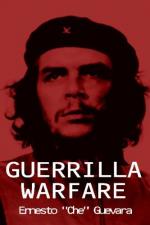
|
| Name: _________________________ | Period: ___________________ |
This test consists of 15 multiple choice questions and 5 short answer questions.
Multiple Choice Questions
1. What organizations will not operate within the framework of guerrilla warfare until the last stages according to Guevara?
(a) Workers' organizations.
(b) Agrarian organizations.
(c) Government organizations.
(d) Military organizations.
2. When did Fidel Castro become Prime Minister of Cuba?
(a) 1962.
(b) 1971.
(c) 1959.
(d) 1949.
3. In the first Appendix, Guevara writes "The revolutionary in a clandestine situation preparing for war should be a complete" what?
(a) Philosopher.
(b) Marxist.
(c) Ascetic.
(d) Soldier.
4. Guevara notes that "Bridges can be attacked with dynamite; if there is no dynamite, those made of steel can be made to fall very easily with" what?
(a) Molotov Cocktails.
(b) Oxyacetylene blowtorches.
(c) Tanks.
(d) Jackhammers.
5. Guevara writes that "what ought never to be done is to employ specially trained, heroic, self-sacrificing human beings in eliminating a" what?
(a) Police officer.
(b) Little assassin.
(c) Government agent.
(d) Dictator.
6. Guevara states that medicine should be stolen from the enemy and procured from what organization whenever possible?
(a) The Blue Cross.
(b) The Soviet Union.
(c) The Green Star.
(d) The Red Cross.
7. Within the propaganda organization there should be periodicals aimed at whom, according to Guevara?
(a) Enemy regime.
(b) Govermental agents.
(c) Enemy soldiers.
(d) External nations.
8. Guevara cites a Chinese aphorism which states, "Know yourself and your adversary and you will be able to fight a hundred battles without a single _____."
(a) Failure.
(b) Fatality.
(c) Disaster.
(d) Victory.
9. What term refers to exclusive control of a commodity or service in a particular market?
(a) Vanguard.
(b) Controller.
(c) Monopoly.
(d) Embargo.
10. Following the Cuban Revolution, Guevara performed a number of key roles in the new government included instituting agrarian reform as minister of what?
(a) Medicine.
(b) Industries.
(c) Transportation.
(d) Finance.
11. When did Che Guevara die?
(a) 1969.
(b) 1972.
(c) 1967.
(d) 1974.
12. What should constantly shift location within the guerrilla organization according to Guevara?
(a) The restrooms.
(b) The battle front.
(c) Headquarters.
(d) The cook tent.
13. Guevara states that besides serving as combatants, women are indispensable for cooking good meals and for transporting what?
(a) Sabotage.
(b) Messages.
(c) Enemy propaganda.
(d) Vanguard.
14. While the number of men in the struggle will vary from place to place, Guevara writes it is possible to start an active movement with as little as how many men?
(a) 5.
(b) 10.
(c) 30.
(d) 20.
15. What service should be in direct contact with enemy fronts according to Guevara?
(a) Naval.
(b) Ground.
(c) Intelligence.
(d) Operational.
Short Answer Questions
1. Guerrilla bands have in the past underutilized who, according to Guevara?
2. According to Guevara, industries of war within the sector of the guerrilla army must be the product of a what?
3. What consists of seating the rifle firmly on any kind of wooden apparatus and without moving or firing the rifle the recruits direct the movement of a target until they think they have a hole at the center exactly in the line of sight?
4. The internal civil organization is responsible for raising supplies and taxes as well as running what operations?
5. What amount of time does Guevara write in the Epilogue "has now passed since the flight of the dictator, the culmination of a long armed civil struggle by the Cuban people"?
|
This section contains 500 words (approx. 2 pages at 300 words per page) |

|




